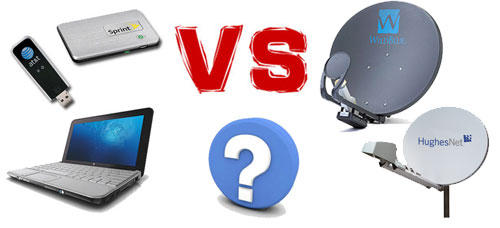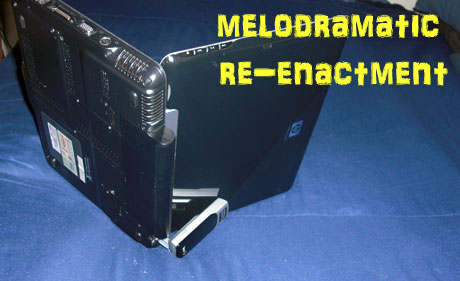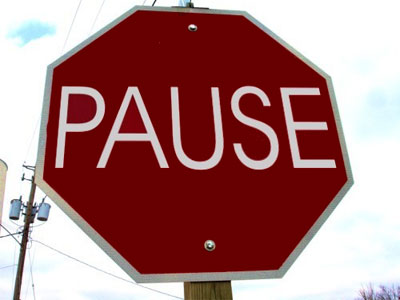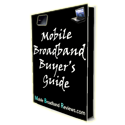
Learn How Mobile Broadband Can Free You From The Tyranny of Tall Trees, Evil Clouds and Expensive Unreliable Satellite Broadband
If you’re reading this right now, then a few things are probably true:
- You live in a ‘fringe’ or rural area that DSL and cable internet companies refuse to service even when offered broadband stimulus money.
- You’ve got a snail’s pace dialup connection that you jokingly tell friends it works via a rusted barbwire (only to be secretly open to trying that if it meant it’d actually work better).
- You’ve either got or heard about spotty satellite broadband that chips out the second a couple drops of rain start to fall. Heck, if you waved your hand above it might just stop working.
- While you get cell phone service where you live, you weren’t 100% sure mobile broadband would work there too.
- You’ve thought about mobile broadband but didn’t trust what the reps at the store said. They could be trying to make a quick buck while you get stuck in a 2 year contract with a device that doesn’t even work where you live.
- Between the installation fee and the 1st month bill of satellite broadband you could’ve bought an affordable $200 – $300 laptop.
If anything I just said makes sense to you then there’s a chance mobile broadband can be the hot chocolate by the fireplace on a cold winter night.
However, before we get into the specifics of how it can do that…
I Have a Confession
I Ignored Satellite Broadband
Here’s some full disclosure.
I don’t live in a rural / fringe area. I’m in a city that gets excellent mobile broadband coverage that I used for a full year as my own connection.
I regularly got speeds that rivaled lower tiered DSL and cable internet plans. To sweeten the deal even further, I had one of the now fabled unlimited mobile broadband plans from Sprint.
It was awesome.
I downloaded to my heart’s content and shared my connection through an ethernet cord plugged into my wireless router for when my friends came by.
But then I broke my AirCard…

I got it fixed…
and then broke it again (I’m not the most careful of the bunch).
After calling up Sprint and explaining the situation, they put me on a ‘seasonal’ travel plan so I wouldn’t have to pay the early termination fee. Not too shabby. For about $10 a month it’d be cheaper than the $200 early termination fee.
When that happened, I started looking at different options for getting mobile broadband:
Cable internet by itself seemed too expensive (I don’t watch TV much since I’d only watch like 2 channels out of 200, therefore no bundle specials for me).
I was interested in DSL but they told me I’d have to get a phone (no good since I’m never really home and when I am I wanna just relax).
I couldn’t go to dialup since I’d never be able to get anything done in a respectable space of time.
And then there was this satellite broadband…
High Speed Internet Anywhere in the Country?
They Had My Attention
I thought it was excellent idea! First, I looked at Hughes Net (the self-proclaimed #1 choice for satellite internet) and saw things like this on their website:
I live in the country and there is no high speed anything here. HughesNet was fast, simple, and cost effective for me. For once a company that said they would do something, and did it better than they had promised”.
“Available everywhere…today. It’s fast — up to 50x faster than dial-up! Flip through Web pages like turning the pages of a book. Download large files in minutes, not hours. Super-fast, always-on satellite Internet connection”
Sounds good right?
Before taking a plunge I decided to check out their competitor WildBlue
I never thought we would ever get this great a service out here in the boondocks! A+ on speed, customer service, and installation. You cannot go wrong with this service. It’s head and shoulders above the rest”.
“WildBlue offers you high-speed Internet access via satellite to almost every corner of the U.S.! Imagine “always on,” lightning fast connections to the Internet. No more dialing in. No more delays. No more wondering if high-speed Internet will arrive in your town”.
It sounded like mashed potatoes with gravy on top (plus the big piece of steak on the side).

Just lovely.
But Then I Heard The Horror Stories
Since I created the Mobile Broadband Buyer’s Guide, I’ve always wanted to know what’s the biggest reason people sign up for mobile broadband.
That’s when I started to hear the horror stories from people like you:
Just spent 3 hours with the official HughesNet repair guy and although he replaced the transmitter and modem, I still can’t connect to VPN.RATS!
The VPN tech guys claim the problem is latency delays and these should not exceed 100ms. I have explained that to my knowledge satellite connections always have delays of 500ms or more, and I have been using Hughes net for the past year. They have no answers“.
– David
“I do not currently have broadband internet access, so I still have to use dial-up because there is not high speed internet service in my area. And I have heard that satellite internet service is horrible“.
– Donna
1) Dial up Sucks
2) Satellite Broadband is no better
3) Rural and no other services available– Dave
I live in a remote (no cable service), wooded (trees too tall for satellite dish) area, so dial-up is my only other choice“.
– Anonymous
No cable in the area and Hughes net’s crappy customer service I can’t abide (tried that before).
– Steven
I live in a place where there is little option for internet service. For me there was only Dial up or Satellite Broadband of which I have heard too many bad things
– Gary
Where we live the only option is satellite high speed internet and I’m just not sure I like all the reviews I see about service from WildBlue or HughesNet.
– Dana
Is there a better solution? I am very frustrated because I live in the country and I hate my satellite broadband.
– Deane
I presently have HughesNet satellite broadband and am disappointed with the download speed.
– Dann
To be fair, I’m sure that WildBlue and Hughes Net has lots of satisfied customers who enjoy satellite broadband. However, if you were one of them, you probably wouldn’t have found yourself nodding your head at what other readers said.
If you’re anything like me, you like to research things a bit before you hop into it (like you’re doing right now). That’s good. I did the same when it I read what the readers said.
Here’s what I found…

Before I go any further, let me give some more full disclosure.
I do profit when someone buys mobile broadband from this site. That being said, it would be easy to make an assumption that I’m just crap talk about Satellite broadband so you’ll buy something.
Not quite.
I make a conscious effort to ensure an honest presentation of the facts so that you can make the decision that’s best for you.
Otherwise, if I hype it up and you don’t like it, you’d just return it anyway, I’d lose money and the provider wouldn’t make money either. (Heavens forbid you might go around and say bad things about me too— Gasp!)
That’d be a lose-lose-lose situation.
For the benefit of everyone involved it, it only makes sense for me to give you the info you need to make a decision that’s best for you.
With that being said…
Mobile Broadband Runs Circles Around Hughes Net & WildBlue
I don’t like making unsubstantiated claims (aka hype).
Here are the hard and detailed facts of what it’s like to get, use and even cancel mobile broadband vs. satellite broadband.
Compared here are the average mobile broadband providers alongside HughesNet and WildBlue satellite broadband:
| Ordering Mobile Broadband | Ordering Hughes Net Satellite Broadband | Ordering WildBlue Satellite Broadband |
| Pick a provider, plan and broadband device.
Most decent mobile broadband plans will be about $60 per month for 5 Gigabytes (more on this in a few). Most decent mobile broadband plans will be about $60 per month for 5 Gigabytes (more on this in a few). |
Pick a plan.
HughesNet satellite broadband plans start at $60 and go as high as $350. The maximum speed of their $60 plan is 1.0 Mbps. That’s the same as the average speed of mobile broadband. The max speed for mobile broadband is 3.1 Mbps (on Verizon’s network). If you want to get a chance at 3.0 Mbps through HughesNet, you’ll pay $190 per month. |
Pick a plan.
WildBlue satellite broadband plans start at $50 per month and go as high as $80. That’s about half the average speed of mobile broadband. The max speed for mobile broadband is 3.1 Mbps (on Verizon’s network) The closest you can get to that is 1.5 Mbps and you’ll pay $80 for it with WildBlue |
| Upfront Mobile Broadband Cost | Upfront Hughes Net Satellite Broadband Cost | Upfront WildBlue Satellite Broadband Cost |
| Today You Pay: $0 Pay nothing today. Activation fee shows up on first bill First Bill: Each Bill After: |
Today You Pay: $0 Pay nothing today, killer charges show up on first bill First Bill: Each Bill After: |
Today You Pay: $0 If owning equipment. If leasing, you’ll pay First Bill: Each Bill After: |
| Activation Fee: $36 Sometimes waived if there’s a special going on and shows up on 1st bill. Equipment Price: Free In a few instances, you actually make $100. Shipping: Free |
Activation Fee: No Cost (sort of) It’s included in the equipment fee Equipment Price: $399.98 $99 upfront in addition to $9.99 for 24 months if leasing. $338.76 total cost over 24 months. Shipping: Free Installation: No Cost (sort of) |
Activation Fee: $149.95 Sometimes $99.95 if there’s a special going on. This account setup fee is separate from their equipment price Equipment Price: $99.95 Shipping: $24.95 Installation: No Cost (sort of) |
| How Long Does It Take To Get It Mobile Broadband? | How Long Does It Take To Get Hughes Net Satellite Broadband? | How Long Does It Take To Get WildBlue Satellite Broadband? |
| Free shipping takes up to 5 business days.
For $4.95, you get it in 2-3 business days. For $14.95, you get it overnight. *if ordered before 2pm central time |
“A HughesNet contractor will contact you within 3 days to set a date and time for installation.
Most customers are installed within 2 weeks of their order”. |
While it’s unsaid as to how long it takes to receive the equipment, the process is most likely similar to HughesNet & cable companies where you set an appointment (1 week or more).
The actual installation is said to last 2 -3 hours (before you get up and running on the internet). |
| What It Takes To Install Mobile Broadband | What It Takes To Install Hughes Net Satellite Broadband | What It Takes To Install WildBlue Satellite Broadband |
| 5 – 10 Minutes on average. Many broadband cards only require you to plug it in, install the software (that’s embedded in it) and then connect to the internet. Some devices like the Verizon MiFi only require you to press the power button, join it’s WiFi network, and then enter the password on the back of the device. In a worst case scenario, you’ll pop in a CD, click a couple times, plug in the device and start surfing. |
Several hours. The actual installation time for HughesNet is not stated. However, the professional installer needs to mount the satellite and verify that it works. Like WildBlue, this will take a couple hours). |
“Professional installation of the WildBlue equpment takes approximately 2 – 3 hours”. |
| If You Use Too Much Mobile Broadband | If You Use Too Much Hughes Net Satellite Broadband | If You Use Too Much WildBlue Satellite Broadband |
| The Achilles heel of mobile broadband is its 5 Gigabyte cap (download limit).
Most companies charge overage fees that can run $100’s of dollars if you go over. Each provider has different fees ranging from $51.20/GB to $500+/GB. The best bet is to know which of the 5 types of broadband users you are and exactly how much 5 Gigabytes can get you. This is especially crucial if it’ll be your only connection to the internet. Don’t have Sprint charging you $590 in one month. While Clear offers true unlimited mobile broadband (not the slow you down if you use too much kind), they’re not available in a lot of places. |
HughesNet will reduce your speed if “patterns of system usage exceed the download threshold for an extended length of time”.
This basically means if you use more than they want you to. To their credit, they relax their ‘Fair Access Policy’ download limits from 2:00am to 7:00am to allow for downloading system updates and the like. However, if it takes longer you’re speed will be reduced for 24 hours if you exceed the ‘threshold’. Depending on the plan, the threshold ranges from 200 MB – 500 MB. It’s not stated if this is per day or per month. Full Details @ HughesNet ‘Fair Access Policy‘ |
WildBlue will reduce your speed (presumably to dialup speed – *cue horror music).
They have what they call download and upload thresholds. It’s basically a cap on how much you can download. While they don’t charge you overage fees, if you go over the limit set, they’ll reduce your speed. $50 plan download limit = 7.32 GB |
| Returning / Cancelling Mobile Broadband If Unsatisfied | Returning / Cancelling Hughes Net If Unsatisfied | Returning / Cancelling WildBlue If Unsatisfied |
| Cancel & Return Within 15 Days If you try mobile broadband out and don’t like it, you can return it within 15 days for a full refund (if you paid anything at all). Call and cancel the service plan attached to the device (much like your cell phone) and you’ll be charged only for the time you used it. (e.g. since most plans cost $60 a month, that’s about $2 a day. Therefore using it for 10 days would be around $20). Cancel & Exchange Within 30 Days Cancel After 30 Days Some providers decrease the early termination fee for each month (similar to WildBlue) Here’s where you can find the full details on returns, exchanges and cancelling. |
Cancel Within 30 Days & Purchased Equipment: You’ll get $200 refund for returned equipment, No service termination fee No refund of installation fee Cancel Within 30 Days & Leased Equipment: Lose the $99 upfront fee and get charged $300 Unreturned Equipment Fee if equipment is not returned within 45 days of cancellation date. Cancel AFTER 30 Days and Purchased Equipment Pay $400 termination fee and get a $200 refund for returned equipment Cancel AFTER 30 Days and Leased Equipment Pay $400 service termination fee. Cancel AFTER 24 month service contract and purchased Equipment Cancel AFTER 24 month service contract and leased equipment $300 Unreturned Equipment Fee if equipment is not returned within 45 days of cancellation date. ——————————— |
“WildBlue customers are required to sign a 24 month contract when they initiate service.
If you cancel the Service before completion of the Minimum Service Term or Extension Term, the Termination Fee is equal to the number of months left in your Minimum Service Term multiplied by $15.00”. If you cancelled in your 2nd month with 23 months of service left, that would be $345 If you cancelled with 12 months left, it’d be $180. |
| What Happens If It Breaks / Mobile Broadband Warranty Info | What Happens If It Breaks / Hughes Net Warranty Info | What Happens If It Breaks / WildBlue Warranty Info |
| Most broadband cards and devices have 1 year warranties that cover normal wear and tear.
If you had an accident, then you’ll need to call the manufacturer, send the card in for an estimate and have them fix it. As an example, when I broke my AirCard’s USB port, it was out of warranty. I shipped it to Sierra Wireless and they fixed it for $35. Extended warranties are available through 3rd parties such as SquareTrade that cover accidents. For more details, see the specific warranty information of the broadband card or device you’re considering (when preparing to purchase the device). |
HughesNet has a “limited warranty term of 24 months* from the date of activation.
Any Equipment replaced or repaired under this warranty will be warranted for the remainder of the original warranty period or thirty (30) days, whichever is longer. “If under normal use and wear, the Equipment becomes defective in materials or workmanship during the warranty period set forth above, Hughes shall at its option and expense, perform one of the following: We will repair or replace the defective Equipment within thirty (30) days of the date the defective Equipment was returned to Hughes’ designated address at your expense, to cause it to comply with the terms of this Limited Warranty”. “If service to the Outdoor Unit (satellite antenna and transmitter) is required, Hughes will, at its expense, repair or replace it pursuant to the limited warranty for the first six months after installation”. “From six months to the end of your limited warranty period, Hughes will cover the cost of the replacement equipment, but the cost of the onsite service technician visit, if necessary, will be paid by you”. “You may request a price estimate prior to the work, based on the type of the replacement”. “If your satellite antenna needs to be re-pointed after the first 6 months of service, a standard onsite visit fee will be charged to you”. “Reconditioned replacement components, parts, units or materials may be used if the Equipment is repaired or replaced” Full Details of HughesNet Warranty |
“For all equipment installed on or after January 13, 2008, the limited warranty term is two years, beginning on the date of installation of the equipment”.
“This limited warranty does not cover damage or affected operation of covered equipment resulting from external causes, including: Accident, acts of God, abuse, vandalism, misuse, problems with electrical power, servicing not authorized by WildBlue, unauthorized disassembly or opening of components (including the modem or transceiver), usage not in accordance with product instructions, failure to perform reasonable required preventive maintenance, and problems caused by use of parts and components not supplied by WildBlue”. “If your WildBlue-supplied outdoor unit requires service under this limited warranty, WildBlue will not charge for any labor costs we incur to repair or replace it (or any component of it) within the first 90 days after the initial installation”. “After this period, WildBlue will cover the cost of the new equipment, but the on-site labor cost must be paid by you”. “WildBlue will provide on-site labor at its standard rates and an estimated charge can be given prior to the work, based on the type of the replacement”. “If your satellite dish needs to be re-pointed after the first 90 days of service, standard on-site labor charges will apply”. Full details of WildBlue’s Warranty |
Should You Get Mobile Broadband Instead of Satellite Broadband?
You should get mobile broadband instead of HughesNet or WildBlue satellite broadband if:
- You’re tired of having no internet when it rains or gets cloudy. Mobile broadband works in the middle of a tropical storm:
You could be online in the middle of a tropical storm while your friends’ Comcast Internet stopped working 24 hours ago. No kidding. True Story
- You’d rather pay the same price for 3G speeds that can be 3 times as fast as the average satellite broadband plan. Average speeds are around the max speed of $60 HughesNet and WildBlue plans.
- You don’t want to wait 2 – 3 weeks to before a technician sets up your satellite broadband before you can get online.
- You prefer your 1st bill to be $100 instead of $275 – $400.
- You’d rather have a broadband card you can take anywhere instead of only having internet access at home.
- You use less than 5 Gigabytes of data per month.
- You’d like to get online as soon as possible (in 1 – 5 days).
- You’d like to try it out to see if it works and if you don’t return & get all your money back (instead of losing $99 to HughesNet’s upfront leasing fee).
- If you do need to cancel and it’s after 30 days, you’d rather pay a $200 early termination fee rather than a $400 termination fee in addition to losing the $99 leasing fee.
- You can’t stand the inconsistently slow satellite broadband you’re paying way too much for.
- The latency of satellite broadband is too high for using Skype, GoToMeeting calls, VPN or playing games online.
- You can get good cell phone service (3 bars or more) from AT&T, Sprint or Verizon. Otherwise you may run the risk of getting crappy slow service. Not good.
Take a quick break
Check if you’ve got 3G coverage in your area with any of major cell phone companies. That way you can see if mobile broadband is an option for you:
Verizon 3G Coverage Map – select ‘Broadband & V Cast’, refresh the map and plug in your address
Sprint 3G Coverage Map – select ‘Data, Email and Multimedia’ and plug in your address.
AT&T 3G Coverage Map – select ‘Data’ (if not already highlighted) and plug in your address.
As far as rural areas are concerned, Verizon & Sprint have the best coverage. In a few places though, AT&T will actually turn out to be the winner. T-Mobile simply doesn’t make the cut just yet.
Who Shouldn’t Get Mobile Broadband Instead of Satellite Broadband?
You shouldn’t get mobile broadband instead of HughesNet or WildBlue if:
- You or your family that uses the internet excessively (YouTube, downloading music, and/or video). You’ll blow through the 5 Gigabyte cap in a heartbeat.
- You’re in a dead zone for all major cellphone providers. Since mobile broadband is provided by cell phone companies via their towers, rural/fringe areas may have a hard time getting good speed and coverage if there’s no cell phone service.
- You learned about the infamous 5 GB cap and saw that it wouldn’t be enough for you.
- You need to download large files or stream a lot of content (music/video) everyday. Regular browsing (email, surfing the web, text and graphics) is usually fine. However, music and video can eat up your 5 Gigabyte cap quickly.
- You’re okay with the speed and reliability that your Satellite Broadband or dialup gives you.
- You’re okay with having your internet conk out on you every time it rains or gets too cloudy.
What Makes Mobile Broadband Different from Satellite Broadband?
- No three week installation time
- You keep all your hair follicles since it actually works
- No $400 first bill
- You don’t need a huge pole sticking out the ground by your house
- You can take it with you anywhere you go in the country
- It doesn’t chip out the second a few water droplets come pouring down.
- You don’t have to battle it out to set an appointment time that you or the installation guy might miss. You install it yourself in less than 15 minutes.
What To Do If You Have Satellite Broadband Now
Do not cancel it…yet.
The last thing you need to do is hop from a warm frying pan into the fire. Instead, try mobile broadband risk-free for 15 days.
It’ll cost you nothing on the spot.
If you don’t like it after 2 weeks, send it back and pay only for the time you used it (half a month would be around $30).
By going through these steps, you’ll learn everything you need to know about mobile broadband before, during and after you buy so you can make the best decision.
If you don’t go through these steps, you run the risk of getting mobile broadband but not having it work (and being stuck in a 2-year contract). If you don’t fully do your research, you could end up paying $60 a month for mobile broadband but still have crappy dialup speeds.
Let’s avoid that.
Step 1: Find Out If Mobile Broadband is Available In Your Area
I’m going to be a bit presumptuous. If you’re reading this, I assume that you live in a rural area with few or no other options for mobile broadband.
With that being said, you’ll need a provider that offers next to the best coverage as well as speed all over the United States.
While there’s a whole fruit basket of mobile broadband providers out there, only 3 have large enough networks that’ll get the job done.
Verizon, Sprint & AT&T.
You may have heard of them.
Verizon and Sprint are the kings of mobile broadband coverage. They’ve invested wads of cash in the hopes of getting people like you and me to give them money each month. While AT&T would like the same, their coverage isn’t as spectacular.
So why include them if their coverage is so crappy?
Easy. There are still a couple places that AT&T has coverage while Sprint & Verizon do not. Sometimes its just the luck of the draw.
So How Do You Check?
Verizon 3G Coverage Map – select ‘Broadband & V Cast’, refresh the map and plug in your address
Sprint 3G Coverage Map – select ‘Data, Email and Multimedia’ and plug in your address.
AT&T 3G Coverage Map – select ‘Data’ (if not already highlighted) and plug in your address.
Make a note of who’s got the best coverage in your area. For a more rugged test, see if you or your friends have 2 or more bars of cell phone service with each/any of the providers.
If service is poor, see “Step 2” for improving coverage/speed
What About Mobile Broadband Speed?
Here’s the super summarized need-to-know info:
| Internet Service Provider | Average Download Speeds |
| Verizon Mobile Broadband | 600 – 1400 Kbps |
| Sprint Mobile Broadband | 600 – 1400 Kbps |
| AT&T Mobile Broadband | 700 – 1700 Kbps |
| Dialup | Up to 56 Kbps! |
*while mobile broadband can have bursts of speed up to 3.1 Mbps, rural/fringe areas are less likely to get these. As such, they’ve been excluded here to avoid any potential sales hype.
In other words, on the conservative side, mobile broadband is ten times faster than dialup.
Step 2: Improve Coverage/Speed In Bad Service Areas (If Necessary)
There may be a chance that you live in a rural fringe area with poor signal. If that’s the case you may need a mobile broadband booster antenna to improve signal (which in turn improves speed).
Now the big question is, how do you figure out if you even need one or if it’ll help?
Luckily, the guys over at EVDOinfo.com (EVDO Blog & 3GStore) have put together some stellar information. I’ve gone ahead and read it all to pick out only the relevant stuff to help you stay on course in the sea of information out there.
Here are the steps you need to take:

Muy Importante!
The following links take you from this site. While I encourage you to purchase a mobile broadband antenna if you need one (I will make money from it), do not purchase your broadband card there.
I will provide a link at the end of the article to another one of our partners that has the best deals handsdown for broadband cards (every card is free and you can make up to $100 from some of them). However…
Do not buy anything just yet.
If you do, you run the risk of ending up with a $590 mobile broadband bill of overage charges. To avoid that, you’ve got to read the next step on whether 5 Gigabytes is enough for you.
Without further ado, on with the show
1. Find out if a mobile broadband antenna will help you (by doing a site survey to find out signal strength):
-
- Wikipedia
- Checked mobile broadband coverage in your area
- Figured out if you need a signal boosting antenna
- Learned that 5 Gigabytes is enough for you
- Gotten familiar with your exit strategy
2. Find out which antenna is best for you or:
3. Go to the 3Gstore pick an antenna based on your mobile broadband card
4. Don’t and then get the actual broadband card for free through our partner (I’ll give you the link at the end of this article. Each step is vitally important).
Bonus Info:
If you’re not sure if the broadband card you’re interested in has an antenna jack to plug into, check this list to see a picture of where the antenna jack is located on the broadband card you’re interested in.
Step 3: Find Out If 5 Gigabytes Is Enough
While there are a bevy of mobile broadband providers, most of them won’t make the cut if you live in a rural area. You’ll need the best in speed and coverage (and maybe even an antenna booster from above) to make it work for you.
There’s one caveat though.
The 3 big providers (Sprint, AT&T and Verizon) all have 5 Gigabyte caps. If you go over these caps, they want stupid sums of money from you. To avoid that, I’ve put together a short article
What Can I Do With 5 Gigabytes?
After reading and figuring out if 5 Gigabytes will do it for you. The final step before getting mobile broadband is having an exit strategy.
Step 4: Have an Exit Strategy
“An exit strategy is a means of escaping one’s current situation, typically an unfavorable situation.
In other words, your exit strategy is what you do when s*** hits the fan.
Will it? Probably not after all this preparation you’ve taken. The real reason however is this:
The Mobile Broadband Buyer’s Guide explains what you need to know, before, during and after buying mobile broadband. Having an exit strategy before you even get it prevents any potential worry of “what do I do if things don’t work out”.
Now that you know what an exit strategy is and why it’s important, what will your exit strategy be?
Here’s Your Exit Strategy
When you decide to get mobile broadband below, try it for about 7 days. That’ll be enough time to figure out if you like it and want to keep it. If you do, then great.
However, if you don’t like it, return it within 15 days for a full refund (if you paid anything at all) in accordance with this return policy. You will also need to cancel your plan.
Step 5: Everything Checks Out? Well Get The Darn Thing Already
Now that you’ve:
You can:
1. Order Your Broadband Card for Free (it does benefit the site)
2. Get a Booster Antenna if you need one (select antennas in the left sidebar. Oh yeah, this is an affiliate link as well)
3. Test it for 10 days. If you don’t like it for whatever reason, return it following these guidelines.
4. Let me know how the ditching dialup is going for you at the bottom of this page
Get Mobile Broadband, Replace Your Satellite Broadband & Stop Paying HughesNet or WildBlue Now
Found this article helpful?

Like this article? It’s part of the free “Mobile Broadband Buyer’s Guide”.

It’s part of the free “Mobile Broadband Buyer’s Guide“.
If you haven’t signed up already, take 30 seconds and do it now. Rather than doing it yourself, take a guided tour through essentials of mobile broadband. It’ll save you time, money all while avoiding buyer’s remorse.
Sure you could search yourself but do you really wanna go through 180+ pages?
Check out the Mobile Broadband E-Course Syllabus & sign up here.
.
***C2_invitation_22300923***


Larry Coppock says:
So far each broadband email has provided a fair and unbiased explanation of the pros and cons for those interested in mobile broadband. The topics have been meaningful and provided a gradual learning experience to one who has been ignoring mobile broadband for the past several years. At no time have I felt as if the information provided was done so for absolute personal gain.
Candice says:
There are new satellite packages available with faster speeds.
Marv says:
Exede (the new Wild Blue) is offering 12Mbps download. With up to 25gb a month. What is your take on this.
Marc says:
That’s pretty impressive actually. Once I’m steadily doing the 2012 postpaid mobile broadband reviews. Once I’ve got prepaid and rental cleared away as well I may have to dedicate a section entirely to satellite.
Thanks for the tip!